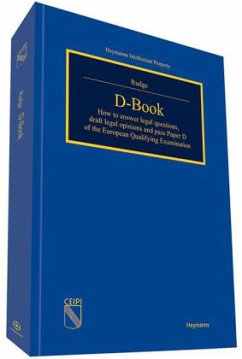The D-Book has been prepared with the intention of offering advice and support for candidates preparing for the legal papers of the European Qualifying Examination (EQE) and Pre-examination.
Part A offers general advice on how the legal papers should be approached and should be used in conjunction with attempts at past papers in order to develop strategy and tactics before sitting the exam itself. A certain number of key legal principles are also explained in Part A.
Parts B and C set out the relevant law under the EPC and PCT, respectively, that needs to be assimilated. Subject matter in these sections has been set out in a logical sequence that mirrors the stages of the patent examination and granting process an applicant encounters in real life. With all the relevant legal materials relevant to each topic brought together, and ordered systematically, it should be easier for even newcomers to patent law to locate important legal basis quickly. The chapters in parts B and C have been aligned to the maximum possible extent, allowing the reader to readily compare and contrast the counterpart stages of the EPC and PCT procedures.
Author:
Andrew Rudge is British and lives in Kent, UK. He studied Natural Sciences at Cambridge University, UK, before completing a PhD in synthetic Organic Chemistry at the same institution. Having worked for several years as a medicinal chemist in industry, he trained to be a patent attorney, qualifying as a European Patent Attorney and Chartered Patent Attorney (UK) in 2004. He has tutored occasionally on the 2-year basic CEIPI course in London, and yearly on the CEIPI Paper D Seminars and CEIPI Pre-examination seminars in Strasbourg.
Zielgruppe:
CEIPI; Teilnehmer u. Wiederholer an der Europäischen Eignungsprüfung; Praktiker auf dem Gebiet des europäischen Patentrechts in Anwaltschaft und Unternehmen.
Kurztext:
How to answer legal questions, draft legal opinions and pass Paper D of the European Qualifying Examination
Rechtsgebiet:
Gewerblicher Rechtsschutz, Deutsches und Europäisches Patentrecht
Part A offers general advice on how the legal papers should be approached and should be used in conjunction with attempts at past papers in order to develop strategy and tactics before sitting the exam itself. A certain number of key legal principles are also explained in Part A.
Parts B and C set out the relevant law under the EPC and PCT, respectively, that needs to be assimilated. Subject matter in these sections has been set out in a logical sequence that mirrors the stages of the patent examination and granting process an applicant encounters in real life. With all the relevant legal materials relevant to each topic brought together, and ordered systematically, it should be easier for even newcomers to patent law to locate important legal basis quickly. The chapters in parts B and C have been aligned to the maximum possible extent, allowing the reader to readily compare and contrast the counterpart stages of the EPC and PCT procedures.
Author:
Andrew Rudge is British and lives in Kent, UK. He studied Natural Sciences at Cambridge University, UK, before completing a PhD in synthetic Organic Chemistry at the same institution. Having worked for several years as a medicinal chemist in industry, he trained to be a patent attorney, qualifying as a European Patent Attorney and Chartered Patent Attorney (UK) in 2004. He has tutored occasionally on the 2-year basic CEIPI course in London, and yearly on the CEIPI Paper D Seminars and CEIPI Pre-examination seminars in Strasbourg.
Zielgruppe:
CEIPI; Teilnehmer u. Wiederholer an der Europäischen Eignungsprüfung; Praktiker auf dem Gebiet des europäischen Patentrechts in Anwaltschaft und Unternehmen.
Kurztext:
How to answer legal questions, draft legal opinions and pass Paper D of the European Qualifying Examination
Rechtsgebiet:
Gewerblicher Rechtsschutz, Deutsches und Europäisches Patentrecht

